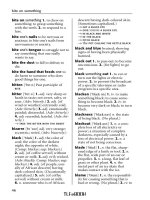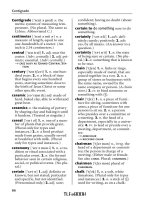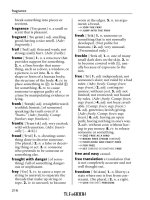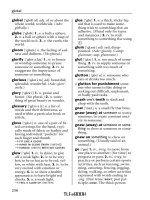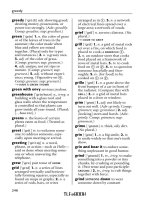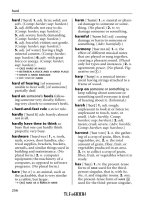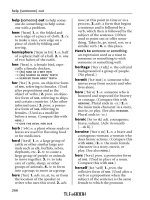NTC''''s Pocket Dictionary of Words and Phrases part 57 pps
Bạn đang xem bản rút gọn của tài liệu. Xem và tải ngay bản đầy đủ của tài liệu tại đây (246.18 KB, 10 trang )
scrub up
1.
to clean oneself up.
2. to clean oneself, especially one’s
hands and arms, as a preparation
for performing a surgical proce-
dure. (A special use of Q.)
scrutinize ["skrut n aIz] tv. to
examine someone or something
closely; to look at something very
closely; to inspect someone or
something.
scrutiny ["skrut n i] n. a close
examination; an inspection; look-
ing at something closely. (No plu-
ral.)
→
under scrutiny
scuba ["sku b@] 1. iv. to dive and
explore underwater. (Past tense
and past participle: scubaed.)
2. the adj. use of Q.
scuba diver ["sku b@ "daI v#] n.
someone who does
scuba diving.
scuba (diving) n. diving or explor-
ing underwater with a tank that
contains air, allowing a diver to
breathe, and that can be carried or
worn on the back. (No plural. An
acronym for self-contained under-
water breathing apparatus.)
scuff ["sk^f] 1. tv. to make
scratches in the surface of some-
thing clean and smooth; to make
marks on the surface of something
clean and smooth.
2. iv. to walk
somewhere without picking up
one’s feet; to slide one’s feet along
as one walks.
sculptor ["sk^lp t#] n. an artist
who makes art out of clay, stone,
metal, or other solid materials.
sculpture ["sk^lp tS#] 1. n. the art
of making art from clay, stone,
metal, or another solid material.
(No plural.)
2. n. a piece of art
that is made out of clay, stone,
metal, or another solid material.
(Often singular with a plural
meaning.)
sea ["si] 1. n. a large body of salt
water that is smaller than an
ocean.
2. n. one of the large bodies
of salt water that cover almost
three-fourths of the earth’s sur-
face; an ocean.
→
at sea
→ at sea (about
something
)
→ between the devil and the deep
blue sea
→ There are plenty of other fish in
the sea.
sea level ["si lEv @l] n. the horizon-
tal level at the surface of the
oceans, which is considered zero.
seafood ["si fud] n. animals from
the sea, including fish, shellfish,
and octopus, that are eaten as
food. (No plural.)
seal ["sil] 1. n. a large animal that
has thick, coarse fur, lives in and
near the sea, and has flat legs.
2. n.
an official mark or design of a
government, business, organiza-
tion, or person that is printed or
stamped on objects for identifica-
tion. (A signature usually serves as
a seal for an individual.)
3. n. a
piece of wax, metal, or other
material that has the mark or
design of a government, business,
organization, or person printed or
stamped on it.
4. n. something
that causes an opening in an
object to remain closed; some-
thing that prevents an opening
from being opened secretly.
5. tv.
to close something tightly; to fas-
ten something tightly, often with
scrub up
526
08 7/23/03 8:50 AM Page 526
TLFeBOOK
glue or pressure. 6. tv. to fill cracks
in an object with a substance so
that air, water, or other things can-
not pass through the cracks.
→
signed, sealed, and delivered
seal
something
off (from
someone
or something
) to make something
inaccessible to someone or some-
thing.
seam ["sim] 1. n. the line of thread
where two pieces of cloth have
been sewn together.
2. n. the line
where two edges of anything meet.
→
burst at the seams
→ come apart at the seams
the seamy side of life the most
unpleasant or roughest aspect of
life. (Informal. A reference to the
inside of a garment, where the
seams show.)
search ["s#tS] 1. iv. to look care-
fully, trying to find someone or
something.
2. tv. to examine
someone or something closely to
try to find something.
3. n. an
attempt to find someone or some-
thing.
search high and low for
someone
or something
Go to hunt high and
low for someone or something.
search
something
with a fine-
tooth comb
Go to go over
some-
thing
with a fine-tooth comb.
seashell ["si SEl] n. a shell of an
animal that lives in the sea; a hard,
protective covering made by an
animal that lives in the sea, such as
an oyster.
seashore ["si Sor] n. the land that
borders the sea; the shore that
runs along a sea.
seasick ["si sIk] adj. being sick
while on a boat or a ship because
of the movement of the sea.
seaside ["si saId] 1. n. the land that
borders a sea; the seashore. (No
plural.)
2. adj. located on the
seashore; at the side of the sea.
season ["siz @n] 1. n. one of the
four times of the year: winter,
spring, summer, and fall.
2. n. a
period of time marked by a cer-
tain kind of weather, an activity,
or condition.
3. tv. to add spices to
food to make it taste better or dif-
ferent.
→
in season
→ out of season
seasonal ["siz @ n@l] the adj. form
of
season W. (Adv: seasonally.)
seasoning ["siz (@) nIN] n. a spice;
an herb; something that is added
to food to make it taste better or
different.
seat ["sit] 1. n. something that is
used for sitting on; a place where
someone can sit.
2. n. the part of a
pair of pants that one sits on.
3. n.
the part of the body that one sits
on; the behind; the buttocks.
4. n.
a place where someone is a mem-
ber, such as in Congress or on a
stock exchange.
5. tv. to provide
someone with Q; to lead someone
to Q; to help someone sit down.
6. tv. to have a certain number of
places to sit; to have room for a
certain number of seated people.
→
by the seat of
one’s
pants
→ show
one
to
one’s
seat
→ show
someone
to a seat
→ take a backseat (to
someone
)
seat belt ["sit bElt] n. a strap that
buckles across one’s lap, as in a car
seat belt
527
08 7/23/03 8:50 AM Page 527
TLFeBOOK
or an airplane. (See also safety
belt
.)
seated ["sit Id] adj. sitting down in
or on something.
seating ["sit IN] 1. n. a particular
arrangement of seats. (No plural.)
2. n. the number of seats that are
available in a place. (No plural.)
seawater ["si wOt #] n. salt water
as found in the sea.
seaweed ["si wid] n. a plant that
grows in or at the edge of the sea.
(Plural only for types and
instances.)
seclude [sI "klud] tv. to keep some-
one away from other people; to
keep something away from other
things or places.
secluded [sI "klud Id] adj. private;
remote; set apart from other
places; kept away from other
places or people. (Adv: secludedly.)
seclusion [sI "klu Z@n] n. the con-
dition of being private and hidden;
a place away from other people.
(No plural.)
second ["sEk @nd] 1. n. a basic unit
of the measurement of time; ¹⁄₆₀ of
a minute; ¹⁄₃₆₀₀ of an hour.
2. n. a
moment; a very short period of
time.
3. n. a unit of measurement
of an angle equal to ¹⁄₆₀ of a
minute or ¹⁄₃₆₀₀ of a degree.
4. n.
someone or something that comes
after the first [one] as in T.
5. adj.
coming, happening, or being
immediately after the first. (Adv:
secondly.)
6. adv. in a position
that is immediately after the first
position.
→
come off second best
→ get
one’s
second wind
→ get second thoughts about
someone or something
→ in
one’s
second childhood
→ on second thought
→ play second fiddle (to
someone
)
second nature to
someone
easy
and natural for someone.
secondary ["sEk @n dEr i] 1. adj.
second in importance; not pri-
mary. (Adv: secondarily.)
2. adj.
[of the education of students]
from the 6th to 12th or from the
9th to 12th grades, depending on
the school district.
secondhand ["sEk @nd "hAnd]
1. adj. [of goods] already used by
someone else; not new.
2. adj. [of
stores] selling used products.
3. adj. not experienced directly
but heard from another person.
4. adv. learned from someone else.
second-rate not of the best qual-
ity; inferior.
seconds n. an additional serving of
food. (Treated as plural.)
secrecy ["si krI si] n. the quality of
being secret; keeping something a
secret. (No plural.)
secret ["si krIt] 1. n. information
known by a small number of peo-
ple, especially people who have
promised not to tell anyone else.
2. n. a mystery; something that
cannot be explained.
3. adj.
known only by a small number of
people who have promised not to
tell anyone else. (Adv: secretly.)
4. adj. working at a job without
others knowing what one does;
doing something without others
knowing what one is doing. (Adv:
secretly.)
→
carry a secret to the grave
seated
528
08 7/23/03 8:50 AM Page 528
TLFeBOOK
→ in secret
→ keep a secret
→ open secret
→ take a secret to
one’s
grave
secretary ["sEk rI tEr i] 1. n. some-
one who is employed to type let-
ters, answer telephones, organize
schedules and meetings, and do
other office work.
2. n. someone
who keeps a written record of the
things that are discussed at the
official meetings of an organiza-
tion.
3. n. someone who is in
charge of a department of the
United States government.
4. n. a
writing desk with drawers and
shelves.
secrete [sI "krit] 1. tv. [for a part of
a plant or an animal] to produce
and release a fluid.
2. tv. to hide
something; to put something in a
place where others cannot see it or
find it.
secretion [sI "kri S@n] n. a fluid
that is produced and released by a
part of a plant or an animal, such
as sap or mucus. (Singular or plu-
ral with the same meaning, but
not countable.)
secretive ["si kr@ tIv] adj. tending
to do things secretly; tending not
to do things publicly or openly.
(Adv: secretively.)
secretly ["si kr@t li] adv. without
being known or seen by others.
section ["sEk S@n] 1. n. a separate
part of a larger group, place, or
thing; a division.
2. n. a unit of
measurement of land equal to one
square mile or 640 acres.
3. tv. to
divide something into separate
parts as in Q.
secure [sI "kjUr] 1. adj. safe from
danger, harm, loss, injury, or theft.
(Adv: securely.)
2. tv. to safely fas-
ten or close something.
3. tv. to
obtain something.
security [sI "kjUr @ ti] 1. n. the state
of being or feeling safe from dan-
ger, harm, loss, injury, or theft.
(No plural.)
2. n. an office or
department concerned with the
protection of people and property.
(No plural.)
3. n. property that is
promised to a bank or lender
when money is borrowed. (If the
money is not paid back, then the
bank or lender will be given the
property. No plural.)
4. n. a mone-
tary asset or debt agreement, such
as a stock or a bond.
5. the adj. use
of Q, W, E, or R.
→
lull
someone
into a false sense of
security
→ social security
security against
something
some-
thing that keeps something safe
against potential loss; something
that protects something against a
loss; a protection.
sedan [sI "dAn] n. a car with four
doors, a front seat and a backseat,
a fixed roof, and room for at least
four people.
sedate [sI "det] 1. adj. quiet; calm;
relaxed; not excited; not moved by
excitement. (Adv: sedately.)
2. tv.
to give someone or an animal a
drug that causes relaxation.
sedative ["sEd @ tIv] 1. n. a drug or
medicine that causes one to sleep
or relax.
2. the adj. use of Q.
sedentary ["sEd n tEr i] 1. adj. [of a
creature] not very active and keep-
ing still most of the time. (Adv:
sedentary
529
08 7/23/03 8:50 AM Page 529
TLFeBOOK
sedentarily [sEd n "tEr @ li].) 2. adj.
[of activity] not requiring a lot of
movement. (Adv: sedentarily [
sEd
n "tEr @ li
].)
see ["si] 1. iv., irreg. to sense or
experience with the eyes. (Past
tense:
saw; past participle: seen.)
2. tv., irreg. to observe someone or
something by the use of the eyes;
to sense or experience someone or
something with the eyes.
3. tv.,
irreg. to understand something; to
comprehend something. (The
object can be a clause with
that
U.) 4. tv., irreg. to learn some-
thing by reading or through direct
observation. (The object can be a
clause with
that U.) 5. tv., irreg.
to visit someone; to stop by the
place where someone lives.
6. tv.,
irreg. to meet with someone for an
appointment.
7. tv., irreg. to date
someone; to have a romantic rela-
tionship with someone.
→
begin to see daylight
→ begin to see the light
→ can’t see beyond the end of
one’s
nose
→ can’t see
one’s
hand in front of
one’s
face
→ Long time no see.
→ not able to see the forest for
the trees
→ not see further than the end of
one’s
nose
→ wait-and-see attitude
see double to see two of every-
thing instead of one.
see eye to eye (about
something
)
and see eye to eye on
some-
thing
to view something in the
same way (as someone else).
see eye to eye on
something
Go
to
see eye to eye (about
something
).
see
someone
off to accompany one
to the point of departure for a trip
and say good-bye.
see
someone or something
as
something
to consider someone or
something the same as something.
see
someone
to
someplace
to
escort someone to a place; to make
sure that someone gets to some-
place safely; to accompany some-
one to a place.
see
something
through to stay
with a project all the way to its
completion.
see stars to see flashing lights after
receiving a blow to the head.
see the (hand)writing on the
wall
to know that something is
certain to happen.
see the light (at the end of the
tunnel)
to foresee an end to one’s
problems after a long period of
time.
see the light (of day) to come to
the end of a very busy time.
see things to imagine one sees
someone or something that is not
there.
see through
someone or something
to recognize the deception
involved with someone or some-
thing.
see (to it) that
something
is done
to make sure of something; to
make certain of something; to be
certain to do something.
see to
someone or something
to
tend to or care for someone or
something.
seed ["sid] 1. n. a part of a plant
that a new plant will grow from if
see
530
08 7/23/03 8:50 AM Page 530
TLFeBOOK
it is fertilized. 2. tv. to plant crops
on an area of land by scattering Q.
→
go to seed
→ run to seed
seedling ["sid lIN] n. a young plant
or tree that is newly grown from a
seed.
seedy ["si di] 1. adj. having a lot of
seeds. (Comp: seedier; sup:
seediest.)
2. adj. run-down;
shabby. (Adv: seedily. Comp: seed-
ier; sup: seediest.)
seeing that
something
is the case
considering that something is the
case; since something is the case.
seek ["sik] tv., irreg. to try to find
someone or something; to look for
someone or something. (Past tense
and past participle:
sought.)
seek to
do something
to try to do
something; to attempt to do some-
thing; to pledge oneself to do
something.
seem ["sim] iv. to appear to be a
certain way; to give the impression
of being a certain way.
seen ["sin] past participle of see.
seep ["sip] iv. [for a liquid] to pass
through something slowly; to leak.
seep in(to
something
) [for a fluid]
to trickle or leak (out of some-
thing) into something.
seep out (of
something
) [for a
fluid] to trickle or leak out of
something.
seep through
something
[for a
fluid] to permeate something and
escape.
segment ["sEg m@nt] 1. n. a part of
something; a part of something
that can be easily separated.
2. tv.
to separate something into parts;
to divide something into parts.
segregate ["sE grI get] 1. tv. to sep-
arate someone or a group of peo-
ple from other people; to isolate
someone or a group of people.
2. tv. to separate people of one
race from people of another race.
segregated ["sE grI get Id] adj. [of
human races] separated by law or
other forces. (Adv: segregatedly.)
segregation [sE grI "ge S@n] 1. n.
the state existing in a segregated
society; the state of races being
separated by law or other causes.
(No plural.)
2. n. the separation of
someone or something from other
people or things. (No plural.)
seize ["siz] 1. tv. to grab, take, and
hold on to someone or something.
2. tv. to take control of something
by force or by authority; to cap-
ture something by force or by
authority.
seize onto
someone or something
to grab onto someone or some-
thing.
seize up to freeze or halt; [of a
machine with moving parts] to
jam and stop suddenly.
seize (up)on
something
1. to grasp
something tightly.
2. to take hold
of something, such as a plan, idea,
etc. (Figurative.)
seizure ["si Z#] 1. n. an act of seiz-
ing someone or something.
2. n. a
sudden attack of a sickness; a con-
vulsion caused by a sudden attack
of a sickness.
seldom ["sEl d@m] adv. almost
never; rarely.
seldom
531
08 7/23/03 8:50 AM Page 531
TLFeBOOK
select [s@ "lEkt] 1. tv. to pick some-
one or something from a group of
choices.
2. adj. specifically chosen;
exclusive; specially chosen. (Adv:
selectly.)
selection [s@ "lEk S@n] 1. n. a
choice; someone or something
that is chosen; someone or some-
thing that is selected.
2. n. a vari-
ety of things to choose from,
especially in a store.
selective [s@ "lEk tIv] adj. choosing
carefully; making careful choices.
(Adv: selectively.)
self ["sElf] n. a reference to a person
as an individual or being. (Usually
in compounds. See also
myself,
yourself, herself, himself, itself,
oneself, ourselves, yourselves,
themselves.
No plural.)
self-addressed ["sElf @ "drEst] adj.
addressed to oneself.
self-centered ["sElf "sEn t#d] adj.
selfish; often thinking only of one-
self instead of anyone else. (Adv:
self-centeredly.)
self-confidence [sElf "kan fI d@ns]
n. the belief that one is able to do
something; confidence in one’s
own ability. (No plural.)
self-conscious [sElf "kan S@s] adj.
aware that one is being seen by
other people, especially when one
is shy or embarrassed around
other people. (Adv: self-con-
sciously.)
self-contained [sElf k@n "tend]
adj. containing within itself every-
thing that is necessary.
self-control [sElf k@n "trol] n. the
control of one’s own actions or
feelings. (No plural.)
self-discipline ["sElf "dIs @ plIn] n.
the discipline needed to control
one’s feelings and actions. (No plu-
ral.)
self-employed [sElf Em "ploId] adj.
working for one’s own business;
not working for other people.
self-esteem [sElf @ "stim] n. the
good opinion one has of oneself;
the respect one shows for oneself.
(No plural.)
self-help ["sElf "hElp] 1. n. helping
oneself without the help of others.
(No plural.)
2. adj. [of books or
techniques] showing people how
to help themselves without the
help of others.
selfish ["sEl fIS] adj. too concerned
with oneself; too concerned with
what one wants instead of what
other people want; showing more
care for oneself than for other
people. (Adv: selfishly.)
selfishness ["sEl fIS n@s] n. the
state of being too greedy and con-
cerned with oneself. (No plural.)
self-reliant [sElf rI "laI @nt] adj.
able to get along or do something
without the help of others. (Adv:
self-reliantly.)
self-respect [sElf rI "spEkt] n. the
respect and pride one has for one-
self. (No plural.)
self-service ["sElf "s# vIs] 1. n. the
system by which one must serve
oneself in a store or business. (No
plural.)
2. the adj. use of Q.
sell ["sEl] 1. tv., irreg. to transfer a
product in exchange for money; to
transfer a product to someone in
exchange for money. (Past tense
and past participle:
sold.) 2. tv.,
select
532
08 7/23/03 8:50 AM Page 532
TLFeBOOK
irreg. to make something available
for purchase.
3. tv., irreg. to cause
something to be more likely to be
used or bought.
sell for
some amount
to be offered
for sale for an amount of money;
to be sold for an amount of
money.
sell like hot cakes [for some-
thing] to be sold very fast.
sell out (to
someone
) 1. to sell
everything to someone.
2. to
betray someone or something to
someone.
sell
someone
a bill of goods to
get someone to believe something
that is not true.
sell
someone or something
out to
betray someone or something.
sell
someone or something
short to
underestimate someone or some-
thing; to fail to see the good quali-
ties of someone or something.
sell
something
off to sell all of
something.
seller ["sEl #] n. someone who sells
something for money.
semester [sI "mEs t#] n. half of a
school year; a term; a 16-week to
18-week period of classes.
semicircle ["sEm I s#k @l] n. half of
a circle; a shape like half of a cir-
cle.
semicolon ["sEm I ko l@n] n. a
punctuation mark (;) that shows
separation between two clauses,
indicating more of a pause than a
comma but less of a pause than a
period. (It is also used to separate
items in a list if any of the items
uses a comma so that the reader is
not confused.)
seminar ["sEm @ nar] 1. n. one of
the meetings of a type of (college)
course that meets regularly with a
professor to discuss theories, stud-
ies, or research.
2. n. a meeting
where a speaker, or panel of
speakers, talks and information or
ideas about a particular topic is
exchanged.
senate ["sEn @t] 1. n. the smaller of
the two groups of people who are
elected to make the federal laws in
the United States.
2. n. the profes-
sors who are the governing body at
certain schools and universities.
senator ["sEn @ t#] n. someone
who is a member of a senate.
send ["sEnd] tv., irreg. to cause
someone or something to be
transported or to go from one
place to another. (Past tense and
past participle:
sent.)
send away (for
something
) to
order something to be brought or
sent from some distance.
send for
someone or something
to
request that someone come or that
something be brought.
send off for
something
to dispatch
an order for something to a distant
place.
send
one
about
one’s
business to
send someone away, usually in an
unfriendly way.
send out (for
someone or some-
thing
) to send an order by messen-
ger, telephone, cable, or fax that
someone or something is to come
or be delivered.
send
someone
in for
someone
to
send someone into a game as a
replacement for someone else.
send someone in for someone
533
08 7/23/03 8:50 AM Page 533
TLFeBOOK
send
someone
in(to
something
) to
make someone go into something
or someplace.
send
someone
into
something
to
cause someone to be in a certain
state or condition.
send
someone
off to participate in
saying good-bye to someone who
is leaving.
send
someone
off (to
something
)
to send someone away to some-
thing or someplace, especially
away on a journey; to be present
when someone sets out on a jour-
ney to something or someplace.
send
someone
out (for
someone or
something
) to send someone out
to search for someone or some-
thing.
send
someone
over ((to)
some-
place
) to order someone to go to
someplace.
send
someone
packing to send
someone away; to dismiss some-
one, possibly rudely.
send
someone
to the showers to
send a player out of a game and off
the field, court, etc. (Figurative
and literal.)
send
something
by
something
1. to
send something by a particular
carrier.
2. to deliver something to
something or someplace. (Infor-
mal.)
send
something
off (to
someone or
something
) to send something to
someone, something, or some-
place.
senile ["si naIl] adj. tending to for-
get things or be confused because
of advancing age. (Adv: senilely.)
senility [s@ "nIl @ ti] n. a state of
confusion and loss of memory
associated with old age. (No plu-
ral.)
senior ["sin j#] 1. adj. [of people]
older; [of employees] having
served an employer longer than
most other employees.
2. adj.
higher in rank or position.
3. adj.
of or for students in the fourth
year of high school or college.
4. adj. for very old or elderly peo-
ple; serving elderly people.
5. n. an
older person; a
senior citizen. 6. n.
a student in the fourth year of
high school (12th grade) or the
fourth year of college.
senior citizen ["sin j# "sIt @ z@n] n.
someone who is 65 years old or
older.
seniority [sin "jor @ ti] n. the qual-
ity of having been employed at
one’s place of work for a relatively
longer period of time than some-
one else. (No plural.)
sensation [sEn "se S@n] 1. n. the
use of the senses; the ability to see,
hear, touch, taste, or smell.
2. n.
an awareness of someone or some-
thing because of sight, sound,
touch, taste, or smell.
3. n. a vague
feeling of awareness; a general
feeling in the mind.
4. n. someone
or something that causes people to
become very excited or interested.
sensational [sEn "se S@ n@l] 1. adj.
very exciting or interesting;
attracting a lot of attention. (Adv:
sensationally.)
2. adj. exaggerated
and designed to excite and appeal
to a mass audience. (Adv: sensa-
tionally.)
send someone in(to something)
534
08 7/23/03 8:50 AM Page 534
TLFeBOOK
sense ["sEns] 1. n. each of the abili-
ties allowing creatures to see, hear,
touch, taste, or smell.
2. n. a spe-
cial feeling or sensation, especially
one that cannot be described. (No
plural.)
3. n. the ability to under-
stand or appreciate something.
(No plural. See also
sense of
humor
.) 4. n. good judgment; the
ability to make good decisions.
(No plural.)
5. n. the meaning or
definition of something; a mean-
ing.
6. n. a belief shared by a
group of people.
7. tv. to be aware
of something with the help of Q.
(The object can be a clause with
that U.) 8. tv. to determine some-
thing; to have a feeling about a sit-
uation. (The object can be a clause
with
that U.)
→
come to
one’s
senses
→ common sense
→ lull
someone
into a false sense of
security
→ out of
one’s
senses
→ sixth sense
sense of humor [sEns @v "hju m#]
n. the ability to laugh at things
that are funny; the ability to see
the funny aspects of a situation.
(No plural.)
senseless ["sEns l@s] 1. adj. with-
out reason; having no purpose;
stupid; foolish. (Adv: senselessly.)
2. adj. unconscious. (Adv: sense-
lessly.)
sensible ["sEn s@ b@l] 1. adj. repre-
senting or showing common
sense; wise. (Adv: sensibly.)
2. adj.
practical instead of stylish. (Adv:
sensibly.)
sensitive ["sEn s@ tIv] 1. adj. able
to feel the effect of something,
especially light, sound, smell,
taste, or texture; easily affected or
harmed by something. (Adv: sensi-
tively.)
2. adj. easily offended; [of
someone] easily affected by some-
thing. (Figurative on Q. Adv: sen-
sitively.)
3. adj. easily able to sense
a small change in something.
sensitivity [sEn s@ "tIv I ti] 1. n. the
ability to sense or perceive some-
thing. (No plural.)
2. n. the ten-
dency to perceive or imagine even
the smallest offense. (Sometimes
plural with the same meaning.)
sensory ["sEn s@ ri] adj. of the
senses; of the ability to see, hear,
taste, touch, or smell.
sensual ["sEn Su @l] adj. providing
pleasure to the body; concerning
the pleasures of eating, drinking,
sex, etc. (Adv: sensually.)
sensuous [sEn "Su @s] adj. affecting
the senses; experienced through
the senses. (Adv: sensuously.)
sent ["sEnt] past tense and past par-
ticiple of
send.
sentence ["sEnt ns] 1. n. a group of
words that forms an independent
thought, usually including at least
a subject and a verb.
2. n. the pun-
ishment given to a criminal by a
judge in a court of law.
3. tv. [for a
judge] to assign a punishment to a
criminal.
sentiment ["sEn t@ m@nt] n. a ten-
der feeling or emotion. (No plu-
ral.)
sentimental [sEn t@ "mEn t@l] adj.
having tender feelings or emo-
tions, often sad or romantic ones.
(Adv: sentimentally.)
sentimental
535
08 7/23/03 8:50 AM Page 535
TLFeBOOK

